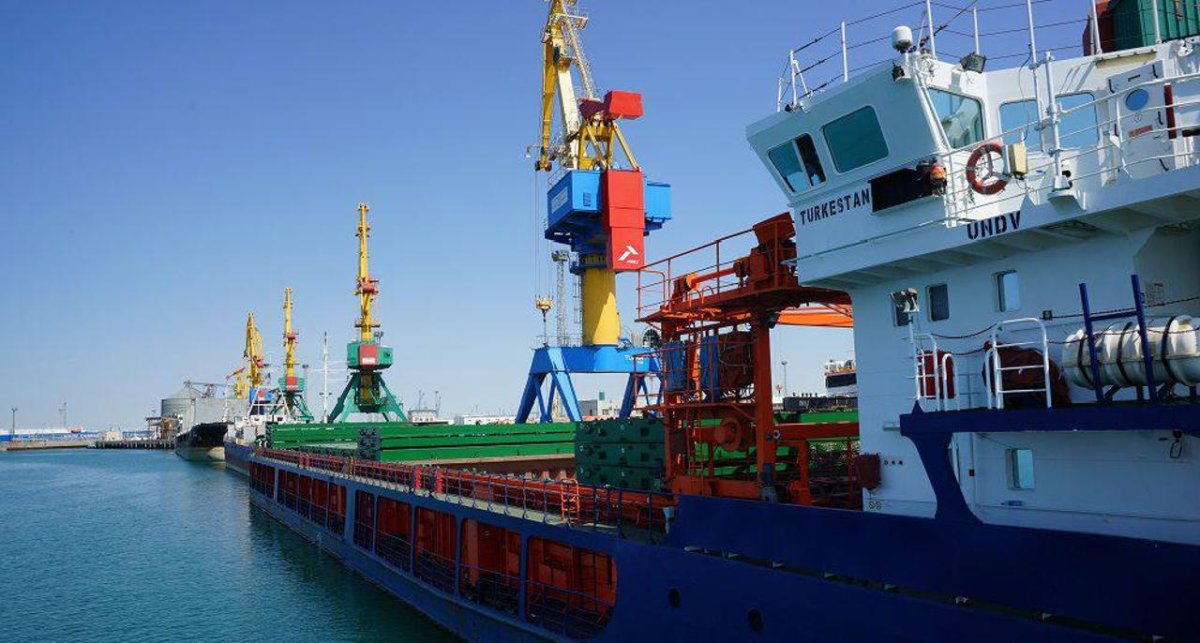ASTANA – The volume of cargo transportation along the Trans-Caspian International Transport Route (TITR) increased by 63% to 2.5 million tons in seven months of 2024, Kassym Tlepov, deputy chairman of the Railway and Water Transport Committee of the Kazakh Transport Ministry said at an Aug. 20 briefing in the Central Communications Service (CCS), reported the CCS’s press office.

Photo credit: ortcom.kz.
Chinese transit surged by over 14 times, with the range of cargo transported along the TITR expanding yearly. Kazakhstan’s ports of Aktau and Kuryk handled approximately 4.2 million tons of cargo, similar to last year’s figures. The country plans to transship nearly eight million tons through these ports by the end of the year, with 4.2 million tons of that volume expected to move via the TITR.
According to a comprehensive plan to develop maritime infrastructure by 2028, additional container terminal capacities in the port of Aktau and four new terminals in the port of Kuryk will be created. The plan also projects a threefold increase in container handling capacity, a doubling of transit cargo transportation, and a 1.5-fold reduction in ship processing and cargo clearance times.
Kazakhstan is also witnessing a 50% increase in import cargo flow, which, in turn, signals growing interest from European companies in the TITR. Investors such as Abu Dhabi Ports, Germany’s Rhenus, France’s CMA CGM, and several Chinese firms are showing keen interest in developing port infrastructure at Kuryk. Among the key projects is the construction of the Sarzha multifunctional terminal, which is expected to handle 9.4 million tons of cargo with an investment of over $200 million.
Dredging operations commenced at the Kuryk port in July, and a third of the planned work has already been completed. Similar dredging is scheduled for the Aktau port in 2025, where the construction of a container hub in collaboration with the Chinese company Lianyungang Port has also begun.
“With customs authorities, work is underway to transition sea checkpoints to a 24-hour operation. A “single window” system will be implemented in ports to streamline the registration of ship documents and cargo transshipment. For these purposes, we are working towards ratifying the Convention on Facilitation of International Maritime Traffic,” Tlepov said.
Efforts are also underway to enhance adjacent railway infrastructure, including constructing 404 kilometers of second tracks and modernizing five stations. A digital platform called Digital Trade Corridor, developed by Singaporean PSA and Kazakhstan Temir Zholy national railway company, is streamlining processes. The Tez Customs system introduced on the border with China reduced transit declaration registration times from 2-3 hours to just 30 minutes.
Aiming to expand its merchant fleet, Kazakhstan plans to build seven new vessels, including three tankers, two ferries, and two container ships. This expansion will help meet the growing demand for personnel in the maritime transport sector, which currently requires an additional 200 sailors.
A vessel traffic control system has been installed in the port of Bautino to ensure safe navigation. By 2025, this system will be extended to the ports of Kuryk and Aktau. The integration of these systems will enable full digital control over vessel movements across Kazakhstan’s sector of the Caspian Sea.
Another promising direction in the water transport industry is the development of river shipping along the transboundary Yessil River, creating a multimodal transit corridor connecting Russia, Kazakhstan, and China. This corridor is expected to fully integrate water transport into Kazakhstan’s overall transport system, maximizing the sector’s potential.


